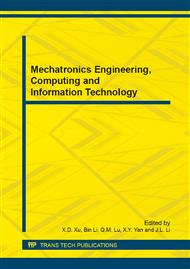[1]
Garey E L, Johnson D S, Sethi R: The complexity of flow-shop and job shop scheduling [J]. Mathematics of Operations Research, 1976(1): 117-129.
Google Scholar
[2]
Ying Kuoching, Liao Chingjong: An ant colony system for permutation flow-shop problem [J]. Computers & Operation Research, 2004, 31: 791-801.
DOI: 10.1016/s0305-0548(03)00038-8
Google Scholar
[3]
Phonsuwan, Seksan: Management system models to support decision-making for micro and small business of rural enterprise [J]. Procedia Engineering, 2010, 8: 498-503.
DOI: 10.1016/j.proeng.2011.03.090
Google Scholar
[4]
Liu Q, Linge N. DEHEMS: The design and implementation of wide-scale domestic energy monitoring [J]. Environmental Energy and Structural Monitoring Systems, 2010, 23(42): 80-86.
DOI: 10.1109/eesms.2010.5634181
Google Scholar
[5]
Ye Xu, Ling Wang: Differential evolution algorithm for hybrid flow-shop scheduling problems [J]. Journal of Syetems Engineering and Electronics, 2011, 22(5).
Google Scholar
[6]
Colorni A, Doigo M: Heuristics from nature for hard combinatorial optimization problems [J]. International Trans Operational Research, 1996(3): 1-21.
DOI: 10.1111/j.1475-3995.1996.tb00032.x
Google Scholar
[7]
Dorigo M, Maniezzo V: A colony Ant system: An Autocatalytic Optimizing Process. Technical Report, 1991, 16.
Google Scholar
[8]
Ishii H, Tada M: Single machine scheduling problem with fuzzy precedence relation. European Journal of Operational Research, 1995, 87: 284-288.
DOI: 10.1016/0377-2217(94)00162-6
Google Scholar
[9]
Macro D: Thomas stutzle ant colony optimization [J]. Cambridge: MIT Press, (2003).
Google Scholar
[10]
DIRK C, MATTFELD ROB J M V. Flowshop-info. txt[EB/OL]. Http: /mscmga. ms. ic. ac. uk/ueb/orlib.
Google Scholar
[11]
Rongwei Gan, Qingshun Guo, huiyou Chang, Yang Yi: Improved ant colony optimization for the traveling salesman problems [J]. Journal of Systems Engineering and Electronics. 2010, 21(2).
DOI: 10.3969/j.issn.1004-4132.2010.02.025
Google Scholar
[12]
Guoxia Zou, Jianhua Liu, Jianqing Tang: The teaching of software engineering based on Gantt Schedule [J]. Journal of Guilin College of Aerospace Technology, 2010, 15(1).
Google Scholar
[13]
Yijiang Zhu: Application of an Adaptive Ant Colony Optimization Algorithm to Flow Shop Scheduling Problem [J]. Joumal of Changzhou Institute of Technology, volume 20, (2007).
Google Scholar
[14]
Qidi Wu, Fei Qiao, Li Li, Ying Wu: Data-based Scheduling for Complex Manufacturing Process [J]. ACTA AUTOMATICA SINCA, volume 35, (2009).
DOI: 10.3724/sp.j.1004.2009.00807
Google Scholar
[15]
Min Liu: A Survey of Data-based Production Scheduling Methods [J]. ACTA AUTOMATICA SINCA, volume 35, (2009).
Google Scholar


